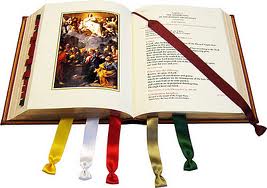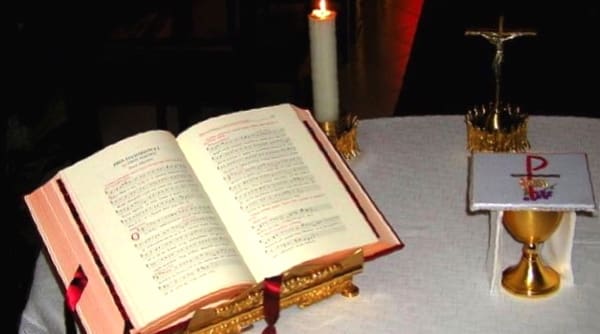Dear Father John, I am looking forward with dread for the new missal translation in our parish. Our  priest doesn’t take the liturgy very seriously and, well, I don’t think it is going to be good. Can you provide some practical insight into how I should look at all of this and prepare my heart? I really care about how we honor Christ in Mass and already struggle a lot with the lack of reverence that I see.
priest doesn’t take the liturgy very seriously and, well, I don’t think it is going to be good. Can you provide some practical insight into how I should look at all of this and prepare my heart? I really care about how we honor Christ in Mass and already struggle a lot with the lack of reverence that I see.
First of all, for any of our readers who aren’t familiar with what the new missal translation is, I want to recommend a couple of resources. The new English translation of the missal (the book containing the prayers, antiphons, and responses of the Mass) goes into action on the First Sunday of Advent, November 27, 2011. What is this new translation and why is it being instituted and what’s it all about? Here are some worthy (in my opinion) explanations: Life Teen’s video; The Bishops’ Conference videos (longer and less flashy than the Life Teen video; EWTN’s discussion with Fr. Mitch Pacwa (hour-long video interview). And if you prefer to read about it, here are a few of the best resources:
United States Conference of Catholic Bishops
Now on to your question.
The Perfect Prayer
Clearly, you care deeply about the Mass, the perfect prayer, the origin of all Christian prayer, and the central act of worship of all time. Your concern and even anxiety about careless or irreverent celebrations of the Mass come across strongly in your question. But that concern can work against you. Even if a priest appears to you to be celebrating the Mass irreverently, the Mass still remains the Mass. Even if he is sloppy and blasé, the Church is still praying through him and Christ is still offering himself to the Father through him. And this is really the main point about praying at Mass: it is our objective worship. Of course we would love to be emotionally (as well as spiritually) uplifted by the external beauty of a papal Mass every day, but even when the externals are sub-par, the reality remains exactly the same.
Room to Grow?
If our devotion to Christ in the Mass, therefore, is easily disturbed by a sloppy or irreverent priest, then we know that our faith has room to grow. Are we truly seeking to please God, or are we seeking the sweetness of consolation for ourselves? If we seek to worship God, then sometimes the less glorious liturgies are even better than the glorious ones. Not because Christ doesn’t always deserve our very best – he does. And the liturgy of the Church should shine with reverence and beauty and respect and mystery (this is one of the reasons we have a new translation coming). But if true worship is about our trusting in God in spite of everything, just as Jesus trusted in his Father on the Cross, then we can actually exercise our trust even more when the externals of a particular celebration of Mass are rather mundane. To pray devotedly in that situation requires a more mature faith, a stronger faith. We have to truly believe that God is working through his Church, through his priest, even when the appearance of things seems to say something else.
I am not encouraging priests to be sloppy – every priest will have to answer to God for how he cares for the sacraments. And believe me, that is a harrowing thought. But as long as the priest isn’t making up his own Mass or otherwise being sacrilegious – as long as he is celebrating the Church’s Mass, then Christ is truly, objectively there. And that should be enough for us.
The Mass is not primarily about me. The Mass is the prayer of the Church, the prayer of Christ. So if I don’t like my priest’s style, that’s a secondary thing. The primary thing remains.
Getting Personal
In my personal journey into the Catholic faith, this realization played an important role. Before being Catholic, when moving into a new area I would shop around to find a church I liked. When I began to be drawn into the Catholic faith, I realized that Catholics don’t do that – they don’t need to do that. They just go to their parish. I still remember moving into a new apartment about a year before officially becoming Catholic. I was so excited to find out what was to be my parish. I called up the diocesan office, told them my address, and they told me which parish I was in. And I went to Mass there. No shopping required! What a relief! The externals, including the notably eccentric style of the priest, were quite different from the beautiful Masses I had attended in Italy during the first stage of my conversion. And yet, the structure and the substance was the same. And I knew that by attending that Mass I was plugging into something much bigger than me, much bigger than that particular priest, much bigger than my own preferences and comfort zone.
Preparing Our Hearts
The advent of the new translation of the missal gives us all a chance to renew our deep faith in that which is “much bigger” than all of us. And this, I think, is the best way to prepare our hearts to receive the new translation: activating anew our faith in God’s action through his Church, through his sacraments, through his very human and very imperfect instruments. The Mass transcends styles and preferences. The Mass gives us something we desperately need in today’s world, which is so focused on personal feelings and subjective fulfillment. It gives us a chance to enter into something not of our own making, and to unite ourselves to an objective act of worship that is Christ’s own prayer, his own sacrifice, his own act of worship, really made present for us – whether or not we happen to feel any spiritual warm-fuzzies, and whether or not we happen to like the way our priest celebrates.
Getting Practical
On a practical note, though, I want to assure you that you don’t need to stay stuck at a dead end. If the style of celebrating Mass at your parish consistently makes it impossible for you to pray during Mass and to appreciate what is really going on, you are not required to stay there. The Church only requires that we attend Mass on Sundays and Holy Days, preferably in our own parish. But we are free to go to other parishes if there is a good reason, or to a nearby monastery or convent. Likewise, if real and serious liturgical abuses have crept into your parish, you have the right (and the duty) to inform your bishop. It’s his job to care for the sacraments as celebrated in his diocese, and to assure that the faithful have access to the liturgical life as the Church intends it.
One more thing. Your question reminds me of a startling quotation from the patron saint of parish priests, St. John Vianney, and I would like to close with it: “There are no bad parish priests; there are only parish priests whose parishioners don’t pray enough for them.” Please keep praying for us priests!!!
PS: I am sure our readers could also provide some suggestions on how they deal with these challenges in a positive and constructive way…





